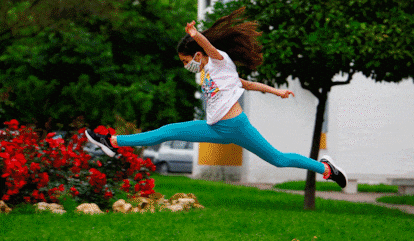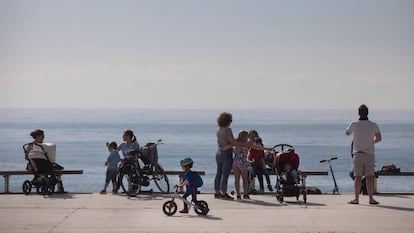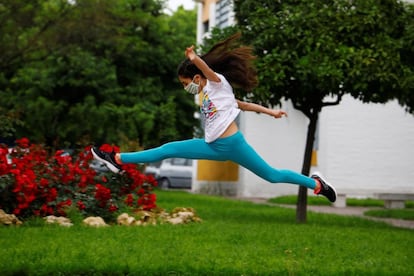Children in Spain take to the streets: ‘I don’t remember how to ride a bike’
For the first time in more than a month, youngsters under the age of 14 were allowed to go outside for a walk within a one-kilometer radius of their home

More than six million children under the age of 14 in Spain were allowed to go out on Sunday for the first time since March 14, when the Spanish government declared a state of alarm in a bid to slow the coronavirus outbreak.
Under the relaxed confinement measures, children under the age of 14 are allowed to go for a one-hour walk within a one-kilometer radius of their homes between the hours of 9am and 9pm. According to the order, published on Saturday in the Official State Gazette (BOE), children must be accompanied by an adult, who can be a parent, legal guardian, person who lives with them, or professional carer.
On Sunday morning, the streets were filled with children riding on their bicycles and scooters. Many children carried toys, with the understanding that they cannot be shared with other youngsters. In some cases, entire families – two parents with two children – were seen outside, even though only one adult is allowed to accompany up to three minors. In other cases, families split the care of the children, with one parent walking ahead with one child, and the other parent and child behind. Others said they planned to divide the one-hour daily outing, with a half-an-hour walk in the morning and one in the afternoon.
In Madrid, seven-year-old Tomás and his four-year-old sister were taken outside by their father. “I am pretty tired, but I am happy,” said Tomás after skating for an hour in the La Latina neighborhood. “The street is very strange. I have seen few people and a lot of dog poo,” he said. “I was very happy to see my friend Nico, but it was also sad because I wasn’t able to hug him.”
In the Spanish capital, it was difficult for families to maintain a safe social distance of between 1.5 and two meters, as recommended by the government. According to an analysis by geointelligence company Inspide, 65% of sidewalks in Madrid are not wide enough to allow for social distancing measures. Many pedestrians on Sunday were forced to step down on the road and wait for others to pass.
Parks in Madrid have been closed since the declaration of the state of alarm. But while they remained shut on Sunday, in some cases there is no physical barrier to prevent entry. Dozens of families took advantage of this to go for a walk even though this is not allowed under the relaxed confinement measures. Children are only permitted to go for a walk in open parks and to the woods, in the case of families who live in rural areas. The government order also prohibits children from visiting playgrounds and recreational areas.

In the city of Barcelona, in Spain’s northeastern region of Catalonia, lots of children were seen near Antoni Gaudí’s famous Sagrada Familia basilica. And in neighborhoods by the beach, which remain closed, many families went for walks along the seaside promenade. Only the odd person tried to cross the red tape shutting off the beach.
Six-year-old Carlota in Barcelona, however, was only interested in seeing her friends. When her father, Cristobál, took her out to a large public square to ride her bicycle, she told him: “I don’t remember how to ride.” “What I want are my friends,” she said.
Meanwhile, in the city of Valencia, on Spain’s eastern Mediterranean coast, people began to take to the street at around 11am. Many chose to go to Turia Garden, the largest park in the city center, which is within a one-kilometer radius of a large number of homes. With playgrounds out of bounds, some parents had to hold on tightly to their children to stop them from playing on the swings or slippery dip.

In the Valencian municipality of Torrent, three-year-old Emma de Mora left home for the first time since March 14. She was accompanied by her mother Rut Ortí, and 10-year-old sister Leire. Both girls were reluctant to return home. “They became a bit sad,” said Ortí. “But we are planning on going out every day and this is also an incentive for them.”
In the southern city of Seville, the streets were empty in the morning but began to fill up as the day advanced. Laura took out her 10-year-old son José David for a walk outside. According to Laura, “everything seems bigger to him, the trees, the squares, but he knows to avoid others if they come near.”
English version by Melissa Kitson.
Tu suscripción se está usando en otro dispositivo
¿Quieres añadir otro usuario a tu suscripción?
Si continúas leyendo en este dispositivo, no se podrá leer en el otro.
FlechaTu suscripción se está usando en otro dispositivo y solo puedes acceder a EL PAÍS desde un dispositivo a la vez.
Si quieres compartir tu cuenta, cambia tu suscripción a la modalidad Premium, así podrás añadir otro usuario. Cada uno accederá con su propia cuenta de email, lo que os permitirá personalizar vuestra experiencia en EL PAÍS.
¿Tienes una suscripción de empresa? Accede aquí para contratar más cuentas.
En el caso de no saber quién está usando tu cuenta, te recomendamos cambiar tu contraseña aquí.
Si decides continuar compartiendo tu cuenta, este mensaje se mostrará en tu dispositivo y en el de la otra persona que está usando tu cuenta de forma indefinida, afectando a tu experiencia de lectura. Puedes consultar aquí los términos y condiciones de la suscripción digital.









































